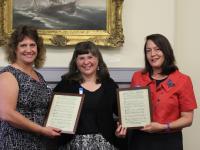Two Pennsylvania teachers were selected as winners of the Teaching Thrift Curriculum Development Contest, sponsored by the Historical Society of Pennsylvania. Arlene Haigh, the grand prize winner, and Susan Condor , the runner-up winner, received their awards at the Creating Thrift Curriculum Teacher Institute, held at the Historical Society of Pennsylvania in July.
Both winners created lessons that introduced students to the history of the thrift movement and then helped them apply its concepts to their lives today. Haigh (pictured at right in photo above), a business technology education teacher at South Mountain Middle School in Allentown, developed a lesson that showed students how to be industrious and thrifty in their use of eBay. The lesson developed by Condor (pictured at left in photo above), a medical office instructor at the Lawrence County Vocational Technical School, helped students in her school be frugal and thrifty as they planned for their prom. Also pictured in the photo is Beth Twiss Houting, HSP’s Senior Director of Programs and Services.
The winners received cash prizes and an all-expense paid trip to participate in the Teacher Institute, as well as a framed facsimile of the School Savings Rally Song from HSP’s collection. The Curriculum Contest was funded by John and Josephine Templeton. Winners were selected by a judge panel comprising staff from HSP, the Institute for American Values, and Sally Flaherty of the Pennsylvania Department of Education.
Thrift, which was championed through schools from the late 1800s through the 1960s, is a contemporary ethic of “wise use” expressed historically through habits of industry, frugality and generosity. Learning about thrift can help students become better citizens and lead more productive lives. Thrift fits into many subjects: reading, writing, economics, history, family and consumer science, and financial literacy.

